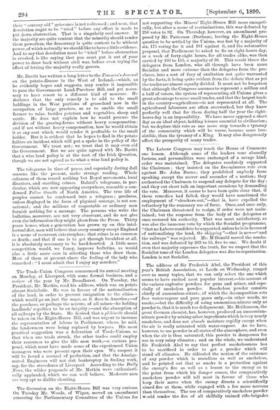The discussion on the Eight-Hours Bill was very curious. On
Tuesday Mr. Woods, of Wigan, moved an amendment censuring the Parliamentary Committee of the Unions for not supporting the Miners' Eight-Hours Bill more energeti- cally, but after a scene of recriminations, this was defeated by 258 votes to 92. On Thursday, however, an amendment pro- posed by Mr. Patterson (Durham), leaving the Eight-Hours question to be settled by the Unions, was lost by a majority of six, 175 voting for it and 181 against it, and the substantive proposal, that Parliament be asked to fix an eight-hours day, or a week of forty-eight hours, for all trades alike, was then carried by 193 to 155, a majority of 38. This result threw the delegates from London, who all through have been more Socialist and niore extreme than the delegates from the pro- vinces, into a sort of fury of exultation not quite warranted by the facts, it being quite evident from the debate that as yet the trades are almost equally divided. It must not be forgotten that although the Congress assumes to represent a million and a half of voters, the system of representing all Unions gives a great advantage to some small trades, and that the largest trade in the country—agriculture--is not represented at all. The agricultural labourers are often overworked, but they know perfectly well that for them during half the year the eight- hours day is an impossibility. We have never opposed a short day as an ideal object, holding leisure essential to civilisation ; but we deplore this vote as one more step towards a tyranny of the community which will be worse, because more irre- sistible, than the tyranny of a King. It may also dangerously affect the prosperity of many trades.


































 Previous page
Previous page